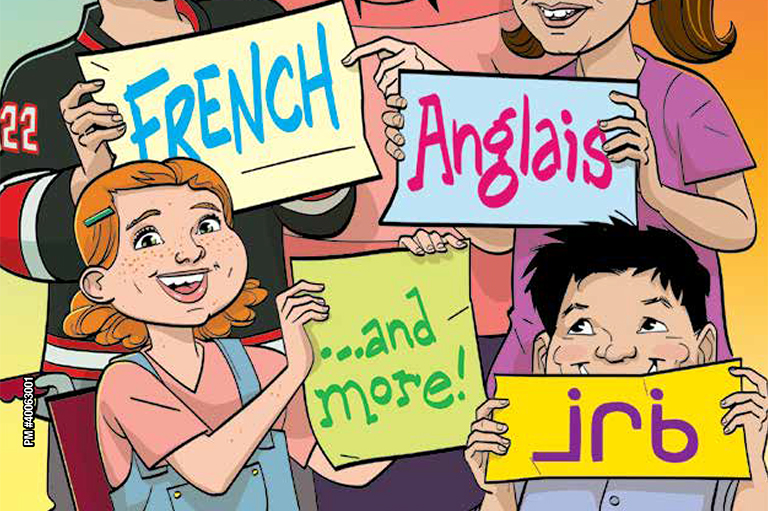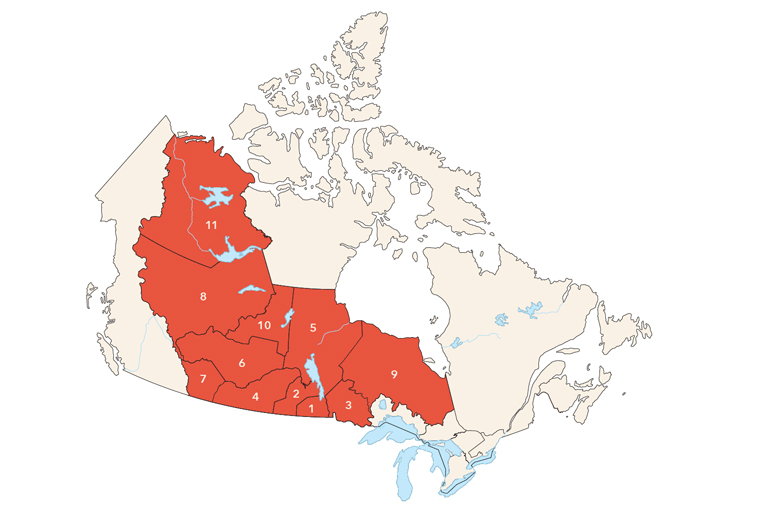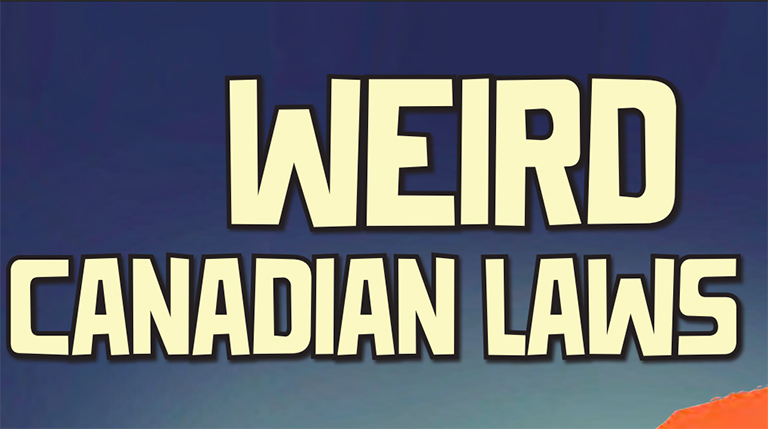Language Rights
This educational package is inspired by Canada in Focus Episode 5: Bilingual, But More.
Advice on incorporating language history in your classroom
Written by Katie Tressel
As a French immersion teacher, it’s difficult to separate language issues from the history content I teach. Students engage with Canadian history through a language that is, for the most part, not their first or main language. While they have a variety of reasons for choosing to study French, many students say they need to know the language because Canada is bilingual. To them, part of being Canadian means learning French. However, French is not particularly visible in British Columbia and speaking the language also means belonging to a community whose identity is forged from the challenges of being in the minority. Language is integral to their explorations of their own identity, and it’s a key part of Canada’s identity as well.
The connection between language, community, and identity is fascinating in Canada. It is no small thing to be a bilingual country, to live somewhere we can reasonably expect to be able to function in both English and French. However, there are more than two languages in Canada: we are also a country with a history of colonialism, strong immigration, and a complex mix of cultures, communities, and languages that stretches from sea to sea. So how do we study languages in Canada? How do we teach students the facts of how Canada became a multicultural, but officially bilingual, country, and how do those facts impact who we are as Canadians today?
The study of languages in Canada offers many different paths to explore. In my courses, my students trace the dominance of English or French in certain regions to the colonialism that established our country, and they consider how being multilingual has been a distinctly Canadian feature, from Indigenous interpreters like Thanadelthur, to political leaders like Louis Riel, and cultural icons like Celine Dion. Students explore the efforts to protect the French language through various legislation and consider the role that language plays in national and regional identity, in separatism, and in historical injustices. There seems to be no shortage of controversy in these questions, and I like using current events (such as Quebec’s Bill 96) to have students explore how language rights are still relevant today.
In recent years, I’ve become more interested in questions of language loss and revival. I love English and French, but I can’t deny the way that these languages have been used through our history as a tool to control and oppress. It is impossible to recognize the value of language in building identity and community without immediately seeing the devastating impact of losing Indigenous languages, and I am drawn to the hope of tools like social media being used to reconnect people to their language.
The relationship between language and identity makes it a fundamental part of what we do in any teaching subject, but it is especially important in understanding the history of our country. The wide variety of languages in Canada tell us a fascinating story about who lives here and how we live together.
More Advice from Teachers
How would you teach language rights in your classroom?
Teaching language rights can be made accessible to students by asking them if they speak another language. This opens up the discussion, since most people in Canada have a connection to another cultural background. It is very positive and affirming. Take a poll, a show of hands, or a response to a Google classroom question. Have a discussion about this. Then, introduce the idea of languages in Canada. Connect it to the idea that now, in Canada, government documents or information can come in multiple languages. Demonstrate this with a current example. Explain that this was not the case in the past, so the discussion about bilingualism and multiculturalism is established.
– Emilia Adorante, Thornhill, Ontario
I teach this topic in the context of my unit on “Resistance, Revolution and Rebellion.” We look at the meaning of these terms and examples of each that have occurred in Canadian history. During this unit, students choose topics to present. The French topics include:
- 1755: Acadian Expulsion
- 1774: The Quebec Act
- 1890: Manitoba Schools Act
- 1945: The Tin Flute
- 1955: The Richard Riot
- 1969: The Official Languages Act
- 1970: The October Crisis
- 1977: Bill 101
- 1980/95: Quebec Referendums
- 2019 – Present: Bill 21 & Bill 96
These dates deal with French culture and the struggle for independence and security within Quebec and outside of Quebec for French-speaking people. We relate the topics back to culture with specific reference to language.
– Jennifer Janzen, Winnipeg, Manitoba
How do you make language rights history relevant and engaging for students?
This topic is quite engaging all on its own. Once we begin to talk about the “Quebec issue,” the students all begin to debate whether Quebec should be part of Canada, the impact of the language/culture bills in Quebec, and current news issues. This is a human rights issue as well, so they often like to debate this topic. I engage the students with the research/presentation topics, debates, and new videos/articles about present issues in Quebec.
– Jennifer Janzen, Winnipeg, Manitoba
More Resources from Canada’s History
Lesson Plans and Activities on Language Rights
Learn More with These Resources
- Video: The Canadian Experiment | Canada: The Story of Us Podcast, Episode 10, CBC
- Official Bilingualism, Canadian Museum of History
- Language Policy in Canada, The Canadian Encyclopedia
- Official Languages Act (1969), The Canadian Encyclopedia
- Quebec Language Policy, The Canadian Encyclopedia
- Official Languages Classroom Activity Guide
- Official Languages Act Education Guide, Historica Canada
- Bill 96: Understanding Québec’s French language law
- Language Loss, Facing History & Ourselves Canada
- “I Lost My Talk” (Poem by Rita Joe), Facing History & Ourselves Canada
- The Office of the Commissioner of Official Language:
Themes associated with this article
Advertisement

Canada in Focus is made possible through the generous support of The Northpine Foundation.



















